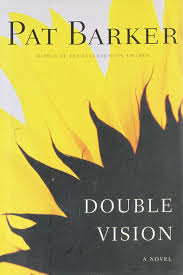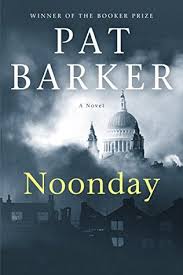Pat Barker is a Genius
No ifs, ands or buts about it – Pat Barker is one of the best novelists around. A bit more than a decade ago I read her Regeneration trilogy, three novels taking place in World War I. It was gripping, amazing, and memorable. They gave me goosebumps. The books were well-read, well-reviewed, and received multiple awards. The last novel in the three, The Ghost Road, won the Booker Prize.
I don’t really know why, but I went for years without reading anything else by her. Barker kept writing, gathering up awards and putting out novels. When I came across a recent review praising yet another novel by her, I decided that it was high time to reacquaint myself with Barker. After a few more reads, my estimation of her has increased.

Barker wrote Double Vision in 2003. It’s a tightly written and yet wandering story with a hole at its middle: a character who was killed in the Middle East. His grieving wife and friend reconnect. No gimmicks in the plot. Instead, events unwind methodically as characters work to make sense of loss, life and meaning. There’s crime, passion, and a gothic feel to it – but without undue ornamentation.
In 2015 she published Noonday, the third novel in a trilogy that also stands on its own. It’s very good – no surprises there – and it deals in a very mature way with trauma, memory, and how people navigate through “history.” Again, at the center of the novel are few well developed characters who interact with each other, trying to figure out relationships, commitment and and meaning. Set during the WWII Blitz, violence defines the environment.

Both novels are sure of themselves and where they are going. Reading them provoked me into thinking through why Barker is so good, why her writing is so powerful. One answer rests on her intelligence. Her observations, her plotting, her language – it’s impossible to read Barker and not be aware that someone incredibly smart and talented has put it together. Even with her relatively straightforward language, I am aware of great wisdom, coupled with curiosity, moving the story along.
Barker shuns the unnecessary . Sentences and paragraphs, ideas and story, are clear and unencumbered. Her words are precise. She does not dumb things down, either, when parsing. It was good to reach for a dictionary when I came across “lordotic.” It’s the curve above your butt and in the paragraph, it fit perfectly.
Themes in Barker’s books are often unsettling. She writes about violence, trauma, and how people manage through it. She is generous with her characters while unsparing in her insights. I feel as though I have learned when I read her – though I never get the sense that she is didactic. There is little frivolity in her novels.
Bottom line – Barker’s writing is mature. It is literature, not fiction, from a grown up for grown ups. And when I’m ready for that, and not distraction, it makes for a very welcome read.
Thank you, Pat Barker, and please keep the prose coming.
David Potash